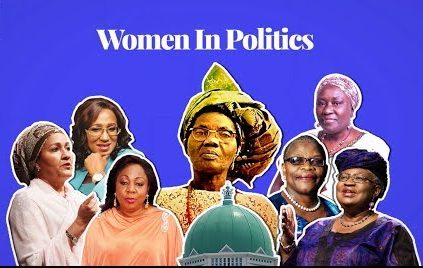Women in Politics
Women’s participation in politics is an important discussion all
over the world.
Data from UN Women shows that women are underrepresented at all
levels of decision-making worldwide and gender parity in politics is unbalanced.
Women serve as Head of States or Government in only 22 countries in the world,
and 119 countries have never had a women leader. At the current rate, gender
equality in the highest positions of power will not be reached for another 130
years; and in national parliaments globally, only 25% of all national
parliamentarians are women. This proportion estimates that gender parity in
national legislative bodies will not be achieved before 2063.
According to the 2021 Inter-Parliamentary Union Global Ranking
for Women in Politics, Nigeria has the lowest number of female parliamentarians
in sub-Sahara Africa and ranks 180 out of 190 countries. Nigeria is 148 out of
182 countries in the global ranking of women in ministerial positions. Although
women make up about 49% of the country’s population and about 51% of them vote
during elections, yet women are underrepresented in elective and appointive
positions. As of 2019, the proportion of seats held by women in national
parliaments in Nigeria stood at 3.38% (Index Mundi).
The National Gender Policy in Nigeria recommends that women
should have 35% representation in both elective and appointive positions.
African countries, Rwanda (61%) and South Africa (46%) are steps ahead of
Nigeria in giving more women opportunities in politics. The UN Women states
that in countries where women are engaged in the public sector, priorities are
largely given to health and education. Research on panchayats (local councils)
in India revealed that the number of drinking water projects in areas with
women-led councils was 62% higher than in those of men. The established and
growing evidence of the positive impact of women in political leadership
suggests that countries like Nigeria may improve if more women participate in
politics.
A new constitution, strong on women’s rights was signed into law
in Zimbabwe, resulting in women gaining 35% of the seats in parliaments in the
country’s 2013 elections. That same year, the number of women legislators in
Kenya rose to more than 20%, a double number when compared to the country’s
previous elections. In 2012, Pakistan’s National Database and Registration
authority registered more than 40 million women voters, this represents 86% of
the country’s female population, and an increase of 44% from four years
earlier. These signs of progress showed that sensitization campaigns,
advocacies, legal and political reforms, all in support of women, play
important roles in encouraging them to take part in politics.
With elections drawing closer, women in Nigeria can take a cue
from the countries mentioned above. Gender biases enforced by religious and cultural
norms in the country, such as those that impedes women from posting bail and
engaging in political activities need to change. Empowerment and awareness programs
like the ones organized by the National Women Trust Fund, aimed at increasing female
representation in governance should be encouraged. Women’s gradual prominence
in the Nigerian business sector has grown to 41%, a feat that should be replicated
in the Nigerian political sphere.


PDF Document